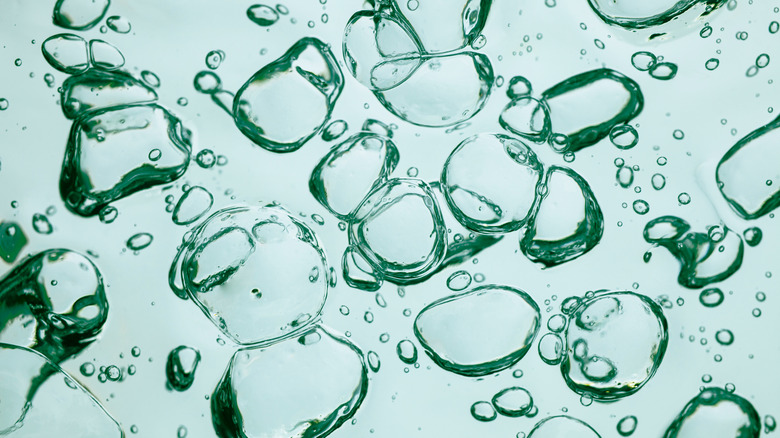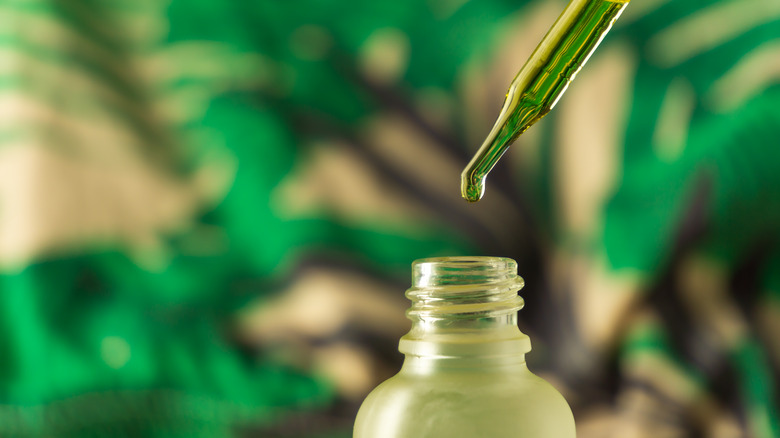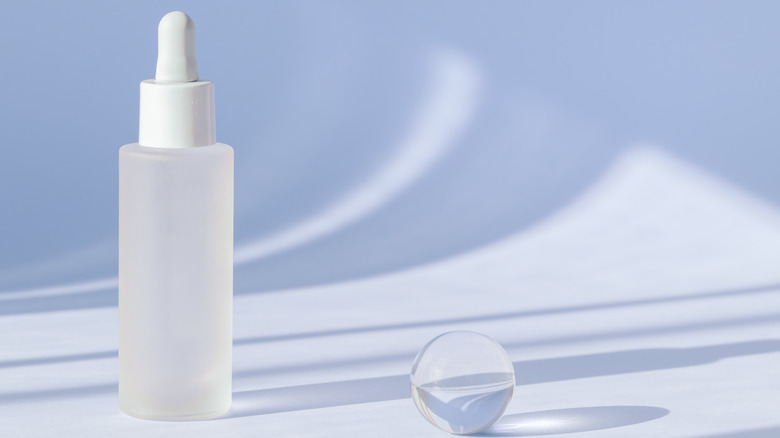Skincare Ingredients You Should Look For In Winter
Wintertime is still alive and well, and you better believe we're feeling it. We're bundled up in our warmest sherpa coats, layering on all the thermals and wool sweaters, and we're not letting go of our Ugg boots any time soon — especially the mini boot version spotted on celebs like Emily Ratajkowski and Kendall Jenner (via Vogue). While we cuddle under our fuzziest fleece blanket and drink some hot peppermint tea, we can't help but wonder how to get our skin moisturized throughout the cold winter season for once and for all. The chilliest days of the year are some of our favorites (really!), what with all the holiday festivities, hot chocolate and marshmallows, cuddly scarves, and the gorgeous snow lining the streets and topping the trees. Still, the season would be perfect if we could just get our skin to cooperate, and be just as glowy, hydrated, and smooth as it is in the summer humidity.
It's no secret winter is harsh on the skin. As explained by Healthline, it is totally normal for skin to start getting dry, patchy, flaky, red, or more uneven when exposed to the cold. A lack of humidity and lower temperatures can suck up all the natural hydration in your skin, and can make it more sensitive to boot. While this is extremely common, and can even happen when simply dealing with constant cold A/C at work, there are tons of skincare ingredients that can keep your skin moisturized no matter the circumstances.
Ceramides
We couldn't start a list of the best moisturizing ingredients for dry winter skin without first naming ceramides, one of the most hydrating skincare components out there. If your skin is dry or scaly whenever temperatures drop below 50 degrees, ceramides that lock in all the precious moisture will become your wintertime BFFs. Cosmetic chemist Ron Robinson told Aedit that applying ceramides "topically can help reinforce the barrier and moisturize the skin." And what is this barrier in question you may ask? The skin's outer layer, which needs all the hydration and strengthening it can get in order to protect your entire body against pollution and toxins, while keeping moisture in (via Healthline). Fellow cosmetic chemist Valerie George echoed Robinson's sentiment, saying that "ceramides are a natural part of the skin barrier and are essential to balanced skin." Noted!
As The Good Face Project explains, ceramides are so vital to protecting the skin's barrier function because it is naturally found in the barrier — as in, your body produces them. As per the outlet, ceramides make up half of the barrier's lipids, and make sure it is powerful yet supple all at once. Ceramides act as a shield that keeps your natural hydration within your skin, and will gently prevent flakiness and scaliness, too. According to The Italian Reve, they even ward off unwelcome substances from entering your skin, and can solve your issues with irritation, redness, eczema, rosacea, or psoriasis (especially those wintertime flare ups).
Facial oils like argan, squalane, and jojoba oil
When it comes to skin dryness come wintertime, we couldn't forget about luxurious, hydrating natural facial oils that lock in moisture while making every day feel like a spa experience in and of itself.
First up, we have argan oil, otherwise known as a skin savior that hails directly from the argan tree found in Morocco. As explained by Mighty Impression, this is one of the best ingredients to add to your wintertime routine, since it is known as one of the most hydrating oils in the world. Why? It has notoriously small molecules that deeply inject skin with hydration, going deeper than other kinds of oils. It also smells heavenly, which is always a plus!
You can also try squalane oil derived from olives, which is known as the perfect oil for anyone with combination skin or who is prone to breakouts or irritation (via Compassion Dermatology). It does not tend to block the pores, and as per L'Officiel, it is great for all skin types. It is known to be non-greasy while forming a "protective layer" over skin that hydrates, strengthens, and gets rid of flakiness and dryness stat. According to The Italian Reve, it locks moisture in throughout the whole day, and improves elasticity.
Lastly, we love jojoba oil for the skin, which is similar to skin's sebum. It goes deep into skin to hydrate from the inside out, and is a natural antibacterial and anti-inflammatory (via Mighty Impression).
Vitamins C and E
While you might expect rich oils and ceramides to take part in a moisturizing winter skincare regime, you may not immediately think of good old vitamins C and E. Sure, they're great, whether you're getting them from oranges and almonds, or just from a daily supplement. But these vitamins can take any wintertime beauty routine to the next level, and make your skin as hydrated as can be.
Vitamin C is a cold weather powerhouse, mostly because it is an antioxidant that works to protect and strengthen the skin — and will get you a radiant summertime glow even if it's the middle of January. As explained by The Good Face Project, pollution tends to worsen with a drop in temperatures, meaning your skin needs an even better shield from environmental triggers in the winter. Vitamin C will act as a perfect line of defense, and as Ron Robinson told Aedit, it is an "essential nutrient" that will "improve skin's tone and texture" – especially all that wintertime dryness and flakiness. It also has anti-aging benefits that work great no matter the season.
Also try incorporating vitamin E in your winter routine, which The Italian Reve says is another anti-aging antioxidant that's just the thing for dry, patchy skin. It works overtime: as per the outlet, it helps skin lock in moisture even in cold weather, reverses damage to the barrier, makes skin more elastic and kicks dark spots to the curb, too. Definitely a win!
Hyaluronic acid
Finally, we get to the ingredient that most of us think of when we want all the possible moisture: hyaluronic acid. This ingredient has gotten especially popular as of late, and has become an "it" component in hydrating skincare. As explained by Healthline, hyaluronic acid is naturally found in the body's tissues, and makes your skin look plump and glowy. It can hold up to 1000 times its weight in water, and is a "humectant" that keeps water on your skin and makes sure it doesn't evaporate away. Of course, you want all the hyaluronic acid you can get if dealing with wintertime dryness.
According to The Italian Reve, this ingredient is pivotal in finding "hydrolipidic balance," aka moisture and dewiness even in the dead of winter, and can also spike collagen levels for a youthful complexion. Using hyaluronic acid in serums or other skincare products will make your skin more elastic, and more radiant. Aedit recommends applying hyaluronic acid to the skin twice a day to make dry skin smoother and more hydrated, but you should tailor use of it to your specific needs. Meanwhile, The Good Face Project suggests incorporating hyaluronic acid into your skincare routine no matter the time of year, explaining that layering the component under a thick, creamy moisturizer will make sure all those much-needed water molecules are properly locked in. Moreover, dermatologist Dr. Hadley King told Real Simple that this ingredient is everything for winter dryness, and can also bring down inflammation.




